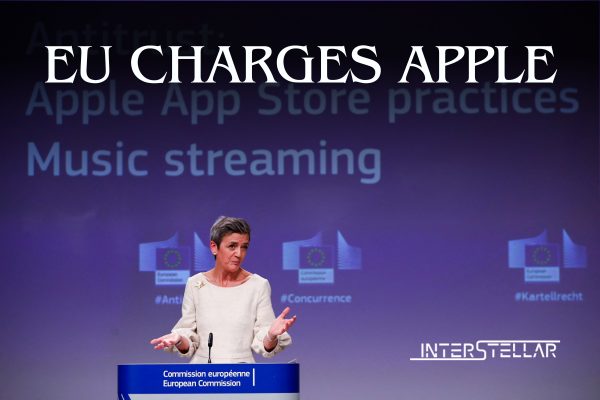EU Charges Apple with Breaching Tech Rules Under Digital Markets Act
European Union antitrust regulators charged Apple (AAPL.O) on Monday with breaching the bloc’s tech rules, potentially resulting in a substantial fine for the iPhone maker. This charge accompanies another ongoing investigation into new fees imposed on app developers.
Preliminary Findings and Potential Fines
The European Commission, the EU’s antitrust and technology regulator, communicated its preliminary findings to Apple following an investigation initiated in March. This charge marks the first under the landmark Digital Markets Act (DMA), which aims to curb the power of Big Tech and promote fair competition for smaller rivals. The Commission has until March next year to issue a final decision. Violations of the DMA could lead to fines of up to 10% of a company’s global annual turnover.
Specifics of the Charge
EU antitrust chief Margrethe Vestager highlighted issues with Apple’s new terms, stating they do not comply with the DMA. She pointed out that the terms restrict app developers from freely communicating and concluding contracts with end users. Apple can avoid fines by addressing these concerns and modifying its business practices.
“As they stand, we think that these new terms do not allow app developers to communicate freely with their end users and to conclude contracts with them,” Vestager stated at a conference. She emphasized that it is up to Apple to determine how to comply with the DMA.
Apple’s Response
Apple responded by stating that it has made several changes in recent months to comply with the DMA, based on feedback from app developers and the Commission. “As we have done routinely, we will continue to listen and engage with the European Commission,” Apple stated in an email.
Criticisms of Apple’s Business Terms
The Commission criticized Apple’s practice of allowing “link-outs,” where app developers can include a link in their app redirecting customers to a web page to conclude a contract. Additionally, the Commission found the fees Apple charges for facilitating the initial acquisition of new customers through the App Store excessive.
Apple defended its new terms, stating, “We are confident our plan complies with the law, and estimate more than 99% of developers would pay the same or less in fees to Apple under the new business terms we created.”
New Contractual Requirements Investigation
The EU executive has also opened an investigation into Apple’s new contractual requirements for third-party app developers and app stores. This investigation will assess the necessity and proportionality of these requirements. Key issues include the core technology fee, the process to download and install alternative app stores on iPhones, and eligibility criteria for developers to offer alternative app stores or distribute apps directly from the web.
Apple introduced these new fees in March in the EU, including a core technology fee for major app developers, even if they do not use Apple’s payment services. This move has faced criticism from companies like “Fortnite” creator Epic Games.
Delay in AI-Powered Features
Vestager also criticised Apple’s recent announcement to delay the launch of its AI-powered features in the EU, attributing the delay to the DMA. She suggested that Apple’s AI integration may be anti-competitive.
Conclusion
The ongoing investigations and charges against Apple under the DMA highlight the EU’s commitment to regulating Big Tech and ensuring a level playing field. The outcome of these proceedings will have significant implications for Apple’s business practices and the broader tech industry.





